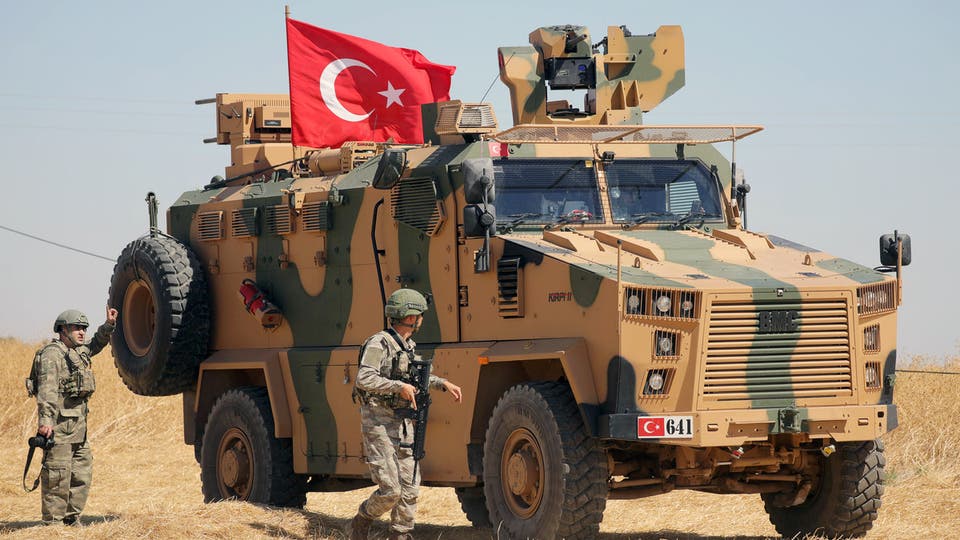Turkey has set up a new military post in the village of Qoqfin, situated in a disputed area of northwestern Syria’s Idlib province, the Syrian Observatory for Human Rights (SOHR) reported on Thursday.
The war monitor observed in the early morning hours Turkish troops and armored vehicles heading towards the new post in the western part of Jabal al-Zawiya, in the southern countryside of Idlib, the last remaining rebel-held bastion.
With the latest outpost, the number of Turkish military posts in the “de-escalation zone” has risen to 69, according to the observatory.
The Turkish move came amid increased tension between rebels and the regime forces of President Bashar al-Assad. Turkey and Russia back opposing sides in Syria’s war, with Ankara supporting the rebels and Moscow backing Damascus.
Clashes around Idlib escalated in December of last year, causing a new humanitarian crisis, with many civilians perishing and more than a million uprooted from their homes.
On March 5 Turkey and Russia agreed on a ceasefire in Idlib following weeks of clashes that brought the two countries close to direct confrontation. Prior to the ceasefire, the clashes in March alone claimed the lives of more than 60 Turkish soldiers around military posts and caused the rebels’ loss of a big chunk of territory in the region.
A full and permanent ceasefire is still to be reached, with the brokered ceasefire reportedly holding “by and large” despite violations.
Russia has repeatedly accused Turkey of not fulfilling its commitments in an agreement made in Sochi to remove rebel groups in Idlib province, such as Hay’at Tahrir al-Sham (HTS), an al-Qaeda affiliated group. In response, Turkey argues that Moscow has not honored the deal by failing to stop daily shelling by the Syrian regime.
After enjoying a relatively peaceful period of six months, the situation in the region started changing in September, when talks between Turkish and Russian officials failed.
Since then, bombardments by the forces of Bashar al-Assad have become routine. Experts have raised concerns about new clashes in October in Jabal al-Zawiya, where Turkey has set up the new post and deployed forces.
Qoqfin is crucial for the defense of Idlib, where the Syrian regime has repeatedly tried to advance and take control.
The joint Russian-Turkish military patrols on the strategic M4 highway have also been suspended for security reasons because the joint patrols came under fire by the Khattab al-Shishani Battalions, a new and opaque militant group. Russia holds Turkey responsible for the attacks as it has not handed over the territory below the M4 to al-Assad control.
If Ankara were to clear the area surrounding the highway of the Khatab al-Shishani Battalions, Russia would not have a pretext to launch a military operation in Idlib, Suhail al-Ghazi, a non-resident fellow at the Tahrir Institute, told Middle East Eye in September.
The Russian side recently accused the Turkey-backed militia of being in preparations for a chemical attack in the region. Russians claimed that jihadists and the Syrian White Helmets were planning the attack in the village of Sfuhon in order to later blame the Russian-Syrian side for it.
White Helmets are a Syrian volunteer emergency response group, officially known as Syria Civil Defence (SCD), whose activities include medical evacuation and urban search and rescue in response to bombing, evacuation of civilians from danger areas and essential services delivery. However, the group is accused by Russia and Syria of links to terrorist activities.
According to a May 2020 report by Amnesty International, the Syrian-Russian offensive since April 2019 has resulted in violations of the laws of war, apparently amounting to war crimes and even to crimes against humanity, as it caused harm to civilians and civilian infrastructure, such as hospitals, schools and markets.
Nearly a million displaced people have sought shelter in some 200 overcrowded camps near the Turkish border with little access to humanitarian services. In fear of a fresh wave of migrants, Turkey has closed its border to Syria’s Idlib province, where thousands are attempting to flee the fighting.


